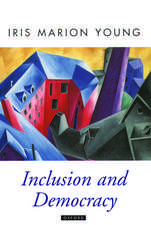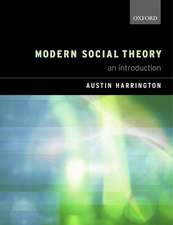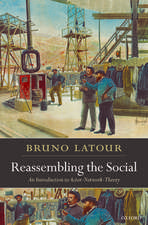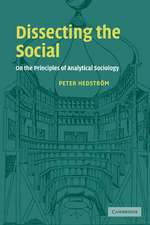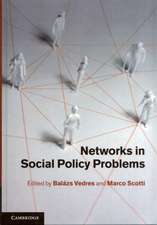Quantum Mind and Social Science: Unifying Physical and Social Ontology
Autor Alexander Wendten Limba Engleză Paperback – 19 apr 2015
| Toate formatele și edițiile | Preț | Express |
|---|---|---|
| Paperback (1) | 226.73 lei 22-36 zile | |
| Cambridge University Press – 19 apr 2015 | 226.73 lei 22-36 zile | |
| Hardback (1) | 585.93 lei 43-57 zile | |
| Cambridge University Press – 22 apr 2015 | 585.93 lei 43-57 zile |
Preț: 226.73 lei
Nou
Puncte Express: 340
Preț estimativ în valută:
43.38€ • 45.42$ • 35.90£
43.38€ • 45.42$ • 35.90£
Carte disponibilă
Livrare economică 17-31 martie
Preluare comenzi: 021 569.72.76
Specificații
ISBN-13: 9781107442924
ISBN-10: 1107442923
Pagini: 366
Dimensiuni: 152 x 229 x 19 mm
Greutate: 0.5 kg
Editura: Cambridge University Press
Colecția Cambridge University Press
Locul publicării:New York, United States
ISBN-10: 1107442923
Pagini: 366
Dimensiuni: 152 x 229 x 19 mm
Greutate: 0.5 kg
Editura: Cambridge University Press
Colecția Cambridge University Press
Locul publicării:New York, United States
Cuprins
1. Preface to a quantum social science; Part I. Quantum Theory and its Interpretation: 2. Three experiments; 3. Six challenges; 4. Five interpretations; Part II. Quantum Consciousness and Life: 5. Quantum brain theory; 6. Panpsychism and neutral monism; 7. A quantum vitalism; Part III. A Quantum Model of Man: 8. Quantum cognition and rational choice; 9. Agency and quantum will; 10. Non-local experience in time; Part IV. Language, Light, and Other Minds: 11. Quantum semantics and meaning holism; 12. Direct perception and other minds; Part V. The Agent-Structure Problem Redux: 13. An emergent, holistic, but flat ontology; 14. Toward a quantum vitalist sociology; Conclusion.
Recenzii
'Wendt's second monograph has been eagerly anticipated. Was it worth the wait? Of course. Beautifully written and painstakingly argued, Quantum Mind and Social Science explores the potential impact that advances in quantum mechanics may have on the social sciences. Notwithstanding the fact that this is probably one of the best introductions to quantum mechanics I have read, the book also raises a series of pressing questions about how a careful engagement with quantum mechanics might alter how we think about social science and social practice … This is a book of speculative grand theorising that is sadly lacking in the social sciences today.' Colin Wight, University of Sydney
'Alexander Wendt, one of the leading and most original voices in International Relations, has now produced what may be his most daring effort yet. In Quantum Mind and Social Science Wendt argues for a new kind of physicalism that encompasses elements of mind all the way down to the quantum processes governing elementary particles. For most social scientists, all that Wendt takes us through will be a revelation. Wendt's discussion of this material is just fabulous, the best lay discussions of the issues I have seen. Whatever one thinks of the final thesis, the journey here is definitely worth the ride.' Douglas V. Porpora, Drexel University, Philadelphia
'This book is very well written and engaging and introduces some very controversial new ideas. The author takes a courageous stance on a number of deep and difficult issues in philosophy of mind. Some of these ideas may ultimately not be supported, and some others may engage never-ending debates. But if even one of them turns out to be right, then the book will have made a great contribution.' Jerome R. Busemeyer, Provost Professor in the Department of Psychological and Brain Sciences, Indiana University, Bloomington
'Alexander Wendt, one of the leading and most original voices in International Relations, has now produced what may be his most daring effort yet. In Quantum Mind and Social Science Wendt argues for a new kind of physicalism that encompasses elements of mind all the way down to the quantum processes governing elementary particles. For most social scientists, all that Wendt takes us through will be a revelation. Wendt's discussion of this material is just fabulous, the best lay discussions of the issues I have seen. Whatever one thinks of the final thesis, the journey here is definitely worth the ride.' Douglas V. Porpora, Drexel University, Philadelphia
'This book is very well written and engaging and introduces some very controversial new ideas. The author takes a courageous stance on a number of deep and difficult issues in philosophy of mind. Some of these ideas may ultimately not be supported, and some others may engage never-ending debates. But if even one of them turns out to be right, then the book will have made a great contribution.' Jerome R. Busemeyer, Provost Professor in the Department of Psychological and Brain Sciences, Indiana University, Bloomington
Notă biografică
Descriere
A unique contribution to the understanding of social science, showing the implications of quantum physics for the nature of human society.


